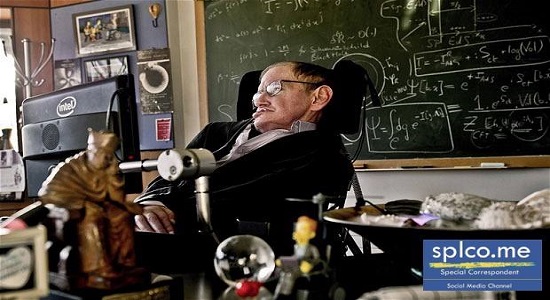The British physicist was known for his work with black holes and relativity, and wrote several popular science books including A Brief History of Time.

"We are deeply saddened that our beloved father passed away today," a family statement said.
At the age of 22 Stephen Hawking was given only a few years to live after being diagnosed with a rare form of motor neurone disease.
The illness left him wheelchair-bound and largely unable to speak except through a voice synthesiser.
His family said that he died peacefully in his home near Cambridge University, where he did much of his ground-breaking work on black holes.
In the statement his children, Lucy, Robert and Tim said: "He was a great scientist and an extraordinary man whose work and legacy will live on for many years."
They praised his "courage and persistence" and said his "brilliance and humour" inspired people across the world.
"He once said, 'It would not be much of a universe if it wasn't home to the people you love.' We will miss him forever."
Prof Hawking was the first to set out a theory of cosmology as a union of relativity and quantum mechanics.
In 2002, following a UK-wide vote, the BBC included Hawking in their list of the 100 Greatest Britons.
He was awarded the Copley Medal from the Royal Society (2006), the Presidential Medal of Freedom, which is America's highest civilian honour (2009), and the Russian Special Fundamental Physics Prize (2013).
Several buildings have been named after him, including the Stephen W. Hawking Science Museum in San Salvador, El Salvador, the Stephen Hawking Building in Cambridge, and the Stephen Hawking Centre at the Perimeter Institute in Canada.
Appropriately, given Hawking's association with time, he unveiled the mechanical "Chronophage" (or time-eating) Corpus Clock at Corpus Christi College, Cambridge in September 2008.
Factfile: Stephen Hawking Born 8 January 1942 in Oxford, England Earned place at Oxford University to read natural science in 1959, before studying for his PhD at Cambridge By 1963, was diagnosed with motor neurone disease and given two years to live Outlined his theory that black holes emit "Hawking radiation" in 1974 Published his book A Brief History of Time in 1988, which has sold more than 10 million copies His life story was the subject of the 2014 film The Theory of Everything, starring Eddie Redmayne.
His famous Quotes includes, "The greatest enemy of knowledge is not ignorance, it is the illusion of knowledge."
"I have noticed even people who claim everything is predestined, and that we can do nothing to change it, look before they cross the road."
In August 2015, Hawking said that not all information is lost when something enters a black hole and there might be a possibility to retrieve information from a black hole according to his theory.
In July 2017, Hawking was awarded an Honorary Doctorate from Imperial College London.
Pi Day is observed on March 14 (3/14 in the month/day date format) since 3, 1, and 4 are the first three significant digits of π . Coincidentally, Hawking passed away on Pi Day.














